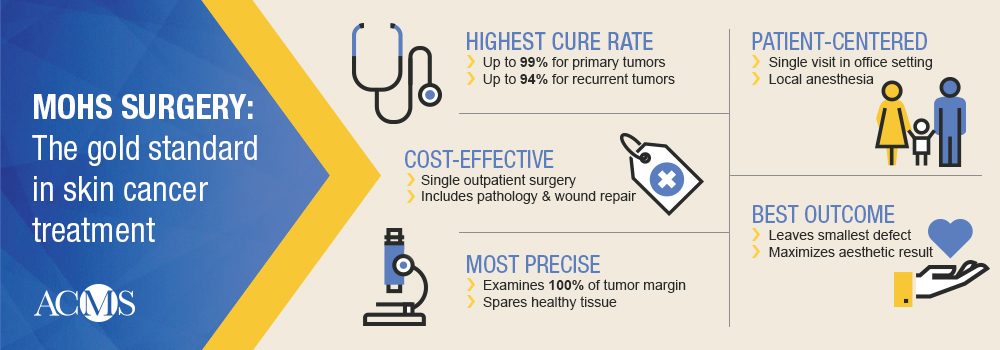
Why Chose a Fellowship Trained Mohs Surgeon?
Only fellowship-trained members of the American College of Mohs Surgery have received rigorous, hands-on direction and education from experienced practitioners of Mohs Surgery.
Requirements include:
- 1-2 years of additional training after dermatology residency
- Minimum of 500 cases during training
- Exposure to rare and complex tumor pathology, difficult tumor locations, and complex wound reconstruction
- Training programs must pass a rigorous application and review process
Our physicians are members of the American College of Mohs Surgery and completed fellowship training in Mohs Micrographic Surgery, Dermatological Oncology and Reconstructive Surgery
When is Mohs Micrographic Surgery Used?
- Delicate areas (face, neck, hands, feet, genitals)
- Skin cancers with poorly defined edges
- Recurrent skin cancers
- Aggressive skin cancers
- Large tumors
- Tumors located near scar tissue
- Rapidly growing or uncontrollable tumors
- Immunosuppressed patients (transplant, cancer, HIV etc.)
What is Reconstruction?
Once the skin cancer is removed you will be left with a wound. Reconstruction is the process of fixing the wound to minimize scarring. The reconstruction is usually preformed the same day as Mohs Micrographic Surgery.
Reconstruction options include:
- Healing by granulation – Allowing the wound to heal naturally on its own.
- Closing the wound with stitches – Involves sewing the skin together with deep and superficial sutures
- Skin grafts – Borrowing skin from another area of the body to cover the surgery site
- Skin flaps – Moving adjacent skin to cover the surgical site
Dr. Golden will discuss with you the different reconstruction options to repair your wound in order to give you the best cosmetic result.
How do I prepare for the day of surgery?
The best preparation for Mohs Micrographic Surgery is a good night's rest followed by breakfast, unless otherwise directed. In most cases, the surgery will be completed on an outpatient (clinic) basis. Because you can expect to be here for most of the day, it is wise to bring along a book, magazine or laptop. We have a wireless network for your convenience. Bringing a snack is also recommended. Because the day may prove to be quite tiring, it is advisable to have someone accompany you the day of surgery to provide companionship and a ride home.
Do I stop my blood thinners?
If you are on medically necessary blood thinners such as Warfarin (Coumadin), Clopidogrel (Plavix), Dabigatran (Pradaxa), apirin or others, we do not usually recommend you stop taking them for this procedure. Exceptions may be made for large tumors or other circumstances. Please discuss what is best for you with your prescribing doctor.
We request that you stop taking any non prescribed aspirin or ibuprofen compounds (like Anacin, Bufferin, Advil or Motrin) at least one week before your surgery. This is because it may interfere with the normal blood clotting mechanism, making you bleed more than normal during surgery. Alcohol, Fish Oil, Vitamin E, Ginkgo biloba and garlic pills also increase your bleeding risk so please discontinue these at least one week prior to surgery.
What Should I Expect After Mohs Surgery?
As with any surgery, you can expect some bruising, swelling and pain. You will have some activity restrictions following the surgery. More details will be discussed with you during your consultation visit.
